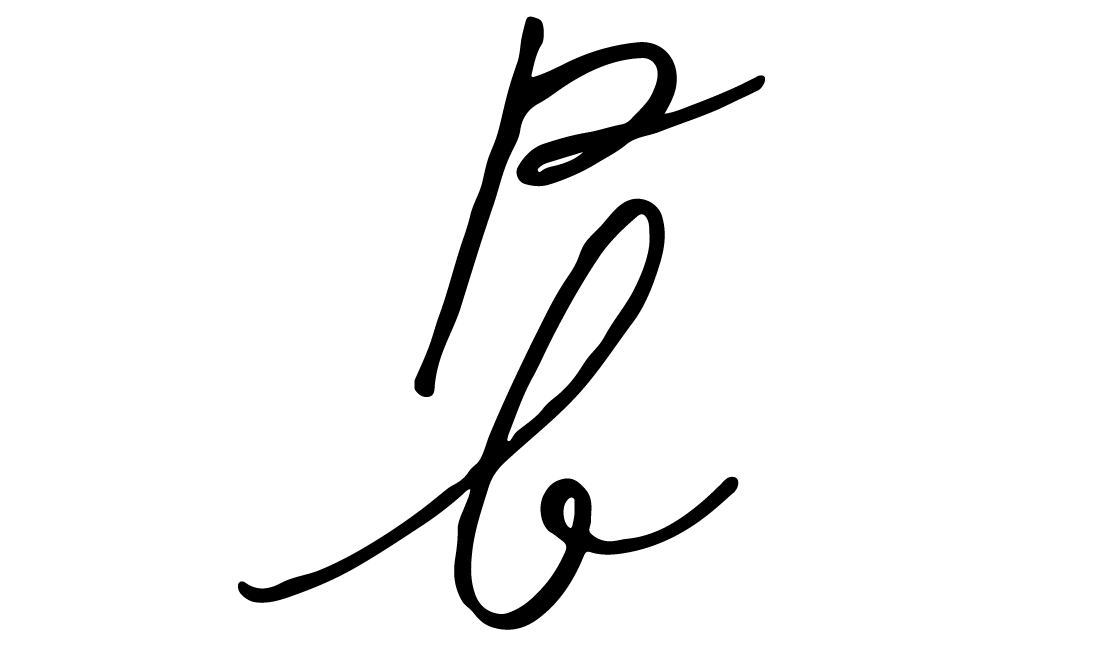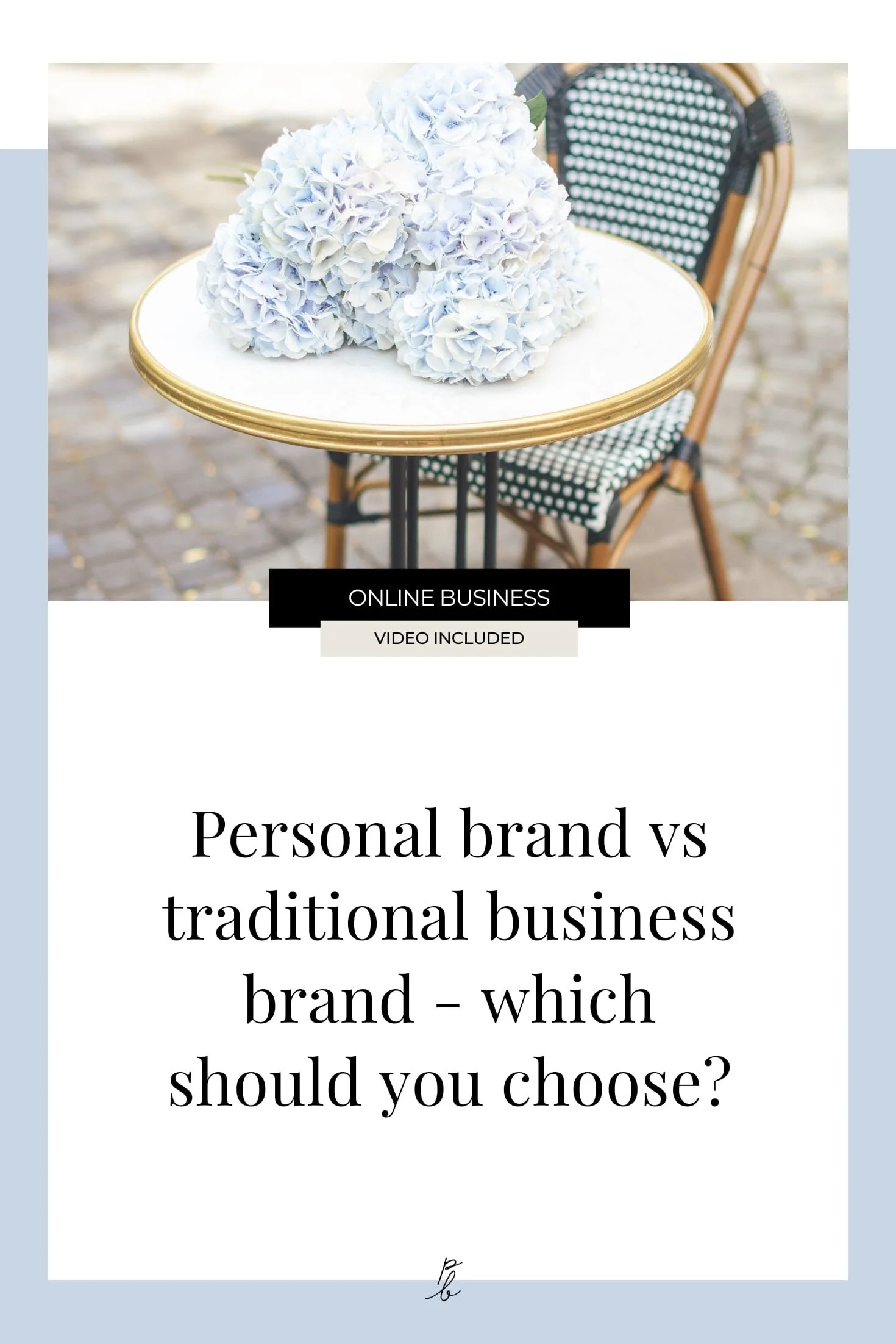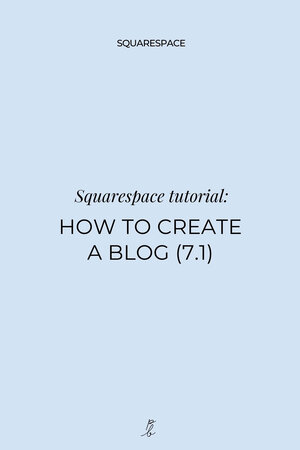Personal Brand vs Traditional Business Brand Which Should You Choose?
Prefer to watch?
Here’s the video!
Mentioned in the Video:
*Denotes an affiliate link - my margarita fund thanks you kindly!
Rather read all about it?
I have run a personal brand for 7 years, but I wouldn't do it again.
I mentioned this insight very very quickly in another video and Bianca picked up on it and asked in the comments
"Something you said piqued my interest. You said you will never own a personal brand again. Why not a personal brand or what are the differences between personal vs non-personal brands?"
Well Bianca, here is your answer!
I'm going to run through 8 key criteria to consider when deciding between starting a personal brand or a business brand, AND which wins on each criteria, PLUS I'll share what I'm planning to do with my business now I have a personal brand on my hands but wouldn't make that decision again.
Here are the criteria we'll be discussing:
Ease of business idea
Ease & cost of starting up
Pivot potential
Durability
Scaleability
Power of the brand
CEO freedom
Sell-ability
1. Ease of business idea
Let's say for example you know you love fashion, but you don't have a specific business idea yet.
You're not sure if you should sell shoes or handbags or styling consulting or personal shopping services.
Typically a business brand starts and sells a product or service right away.
For example, a business brand starts up and runs…
a coffee shop.
Or sells strollers.
Or sells financial advising services.
Business brands have a specific business idea and they create it.
With a personal brand, if you knew you loved fashion but you’re not exactly what to offer yet, you could start building the audience on the topic and take your time to define exactly what the paid offer is.
And if the paid offer requires a level of investment or capital that you don't have, say you want to sell beautiful dinnerware but you don't have the capital yet to invest in buying hundreds or thousands of plates, cups, and cutlery from a manufacturer, you could build the brand, and do a brand collaboration to start earning while building the capital to start your own line of products.
I think of, for example Victoria from In The Frow just launched a fashion collection with a fashion brand Holland Cooper.
Holland Cooper has the manufacturing and design and production and distribution capabilities that Victoria doesn't have, so Victoria launches a collection that she designed in collaboration with Holland Cooper.
She's creating products and earning while potentially building the ability & capital needed to launch her own fashion brand. (I should say, I have no insider insight here, maybe Victoria has no plans to launch her own fashion line, I don't know, but it would be a very well-trodden path if she did do it.)
So in summary, if you have a specific business idea, a business brand is great.
If you're not 100% nailed on what the business idea is yet, a personal brand is a lot more flexible and allows you to build the audience while developing the idea and/or communicating with your audience about what the idea should be.
So because I think personal-brand is more flexible on this one, it wins for in this category.
2. Ease & cost of starting up.
This one is a major factor if content creation is going to be a chosen form of marketing for you.
When I started creating content, it was a team of me, myself and I.
Pst… if that sounds like you - make sure to grab my content creation outlines to help you on the content creation train!
I was straight out of college and I didn't have the revenue to pay someone to create the content for me.
So I created the content and by extension, my audience automatically started building a relationship with me.
Some businesses start this way, but then with time hire team members to also create content, so relationships are built with multiple people.
The challenge is: You need to do everything you can to keep those team members long-term and they suddenly have a lot of leverage as the one who has a connection with your audience over you as the business owner.
So for a personal brand, this is way easier and cheaper both in the startup phase and longer-term to be a personal brand.
It's more costly in the startup phase to be paying someone to create that content and long-term they've got strong leverage to make demands to stick around.
This could of course be mitigated by adding multiple characters to the content creation so your audience doesn't develop a relationship with just 1 other person.
So in terms of the winner, personal-brand definitely gets it when it comes to ease and cost of starting up.
3. Pivot potential
Business brands are built around an idea or a product or a service.
If your business sells copywriting services, and you suddenly can't bring yourself to write another word of copy because you're just over it after 7 years and what you really want to do is teach gardening... it's pretty much impossible to explain that kind of pivot as a business brand.
At that point what you'd have to do would be to sell the copywriting business and start up a gardening education company.
As a personal brand, you however could make that pivot.
You could tell the story of how you found your love for gardening and how it's been the thing that for the past few years has allowed you to decompress from the demands of running a copywriting business, which seeing as your copywriting clients are typically business owners, some of them may resonate with that story of needing to decompress from their entrepreneurial work.
Now that's a very extreme pivot example, but it's not out of the realm of reason.
Tim Ferris went from talking about lifestyle design and productivity to learning languages to marketing books to psychedelics to now un-optimizing your life, so the exact opposite of what he started with.
So for pivot potential, it without a doubt goes to personal brands.
4. Durability
I saw a YouTuber once speak about how a business brand is like a triangle.
You have the CEO at the top, then some managers then the employees who do the day-to-day work.
The CEO makes decisions and they get implemented lower down the triangle.
A YouTuber business, which is most often a personal brand is like an inverted triangle. The personality is the key to the business.
Then they have a team which helps them higher up the triangle, but if something happens to the personality, the whole business model crumbles.
It can't continue operating without the person who the personal brand is based upon. And I couldn't agree more with this analogy.
So in terms of durability, that is the businesses ability to withstand pressure and damage, it without a doubt goes to the triangle which is the right way up, and that's the business brand.
5. Scaleability
Again taking the inverted triangle into consideration, even with the most optimized, systematized business in the world, there will still be a limit on the scale a personal brand can grow to seeing as the personality needs to be the one in the photoshoots, they need to be the one to be on the lives and at the events and all the rest.
Inherently, there's a limit on what a personal brand can achieve.
There's a reason the Walmarts and Amazons of the world aren't personal brands, you just can't achieve that level of scale when 1 human is key to the business.
So the winner on scaleability is the business brand.
6. Power of the brand
What do I mean by power of the brand?
I mean how captivating is it?
How convincing is it?
How deeply does the audience connect with it?
How strongly does the audience identify with it?
Business brands might have values and a stance on a topic, Patagonia's 1% for the planet comes to mind, which means that those for which the environment is a primary focus and concern will be more aligned with the brand, but let's be honest, business brands are faceless, and personal brands are human.
The personality in the personal brand likely has an extreme number of touch points a person in their audience could connect with.
Think about Jenna Kutcher.
If you've also had a miscarriage, you may have related deeply to her.
If you're from the Midwest she feels like she could be your neighbour.
If you've struggled with loving your body or wanting more than a windowless cubicle, or if you were a photographer or if you're also on a non-toxic skincare kick, you'll relate to her deeply.
If you're religious, and take God's will into consideration in your business decisions, again you relate to her.
There's a reason business brands hire celebrities and influencers to be their spokespeople and feature in their advertisements.
Because a person makes the brand more personable. And when you like a person, you're more likely to buy.
So without a doubt, the power of the brand winner is personal brands.
Of course if you're a business brand and want a little bit of this power, you could hire celebrities and influencers to be spokespeople and faces of the brand, but it's still not as powerful as a fully personal brand.
7. CEO freedom
One time we were hosting a course sale, and for me as the personality of the personal brand, the only person my audience wanted to show up and deliver the training was me.
I had plenty of team members who could technically deliver it, but my audience has the relationship with me.
The problem on this specific course sale was I was really going through a bit of a personal life crisis one launch, and as much as I wanted to crawl under my covers and not come out for the week, the launch was running and I needed to show up.
There's a lot in my business I can pass off to team members if I'm not feeling up to it for whatever reason, but going live to host a training and sell a course so far hasn't been one of them.
So coming back to our inverted triangle analogy from earlier, I think the answer to this is pretty obvious, if a personal brand hinges on the personality, that means there's a built-in level of a lack of freedom with that style of business model. That launch was the first time I realized maybe the personal brand choice I had made was all it was cracked up to be.
So business brand wins for CEO Freedom.
8. Sell-ability
Personal brands and business brands can both technically be sold, BUT the value of the company and therefore the sale price will be greatly influenced by the future potential of the company without the former founder & CEO.
And a personal brand company will take a lot larger of a hit without its founder and personality present in the long run.
When I started my business, I thought of selling or "exiting" as something tech bros did. At the time I looked at my business just as me being a freelancer, not some corporation to be sold. I thought when I didn't want to do the job anymore, I'd do what any employee or freelancer did and go get another job.
Which of course I always can, BUT you're kinda leaving money on the table by not selling a massively valuable asset.
A business that makes an incredible profit and incredible impact is valuable, and letting it die when the founder has a new passion is a real shame.
Overall, both types of businesses are sellable, but a business brand is likely to command a significantly higher price at exit than a personal brand, so the business brand wins here.
As you can tell, a LOT of the factors involved in starting up a business favor the personal brand, but the long-term criteria are stronger for the business brand, which is likely why only a few years down the road did I realize there were some unexpected downsides to the model I had chosen.
Now I said at the beginning I wouldn't start a personal brand again, but the fact is I have one.
So what am I going to do about it? Here's what I'm doing & thinking:
I love the concept of a personal brand which creates separate business brands for different products & services.
For example, Kara and Nate are incredibly popular YouTubers and they've launched two separate business brand companies.
They promote those business brands through their personal brand, but not all of the marketing relies on them. They're being built as business brands, with distinct names, team members operating the businesses, and marketing channels of their own.
Kara & Nate created them, got the ball rolling in the businesses from their own audience and then the business operates autonomously.
I love this idea!
If Kara and Nate ever want to settle down and not travel 24/7, they can get the business brands to the point they're earning enough off of them, they can put up their feet and have those business run and enjoy the profits, like CEO's of business brands do!
Or if they want an injection of cash, they can sell those businesses as they're business brands that are perfectly placed for exiting!
The other avenue which I've decided upon is building my audience as a personal brand, monetizing it to continue funding its growth via my own digital products and affiliating for other products and/or physical product collaborations.
(like the example I gave of Victoria and Holland Coopers line)
until I have the capital to create what I really want to, physical products & experiences, which are very costly to start up.
Now you know the pros and cons of personal brands, this is just a fraction of the insights I've recently shared on my behind-the-scenes thoughts on my business.
The video led to Bianca's comment asking about this topic was the 10 things I'm afraid to tell you video.
Watch it next here to learn more of my deep, dark business secrets that I was terrified for years to share and was holding back on for years, until now.




